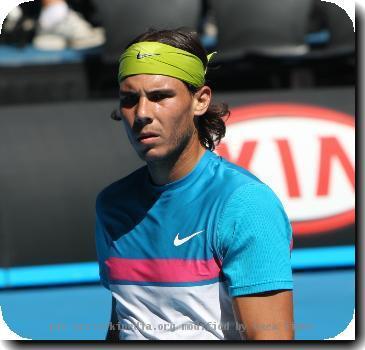Court of Arbitration for Sport clears French tennis player Richard Gasquet of drug charge
By Graham Dunbar, APThursday, December 17, 2009
CAS clears Gasquet of drug charges
GENEVA — French tennis player Richard Gasquet was cleared of any wrongdoing Thursday when the Court of Arbitration for Sport accepted his claim that he tested positive for cocaine by kissing a woman in a nightclub.
The CAS dismissed appeals by the World Anti-Doping Agency and International Tennis Federation, which wanted Gasquet banned for up to two years.
The court in Lausanne accepted Gasquet’s claim that he inadvertently consumed cocaine by kissing the woman in a Miami club hours after withdrawing injured from a tournament in March.
“It was impossible for the player, even when exercising the utmost caution, to know that in kissing a woman who he had met in a totally unsuspicious environment, he could be contaminated with cocaine,” the court said in a statement.
A CAS panel of three lawyers said the quantity of the drug in Gasquet’s urine test was “minute” and the 23-year-old Frenchman was “clearly not a regular cocaine user.”
“The possibility of contamination became the most plausible explanation,” CAS said.
The verdict was greeted with dismay by WADA and the ITF, the sport’s world governing body.
“WADA considered that the evidence warranted full and total scrutiny,” director-general David Howman said in a statement. “WADA abides by the CAS ruling and has no further comment at this stage.”
ITF president Francesco Ricci Bitti said the federation was “disappointed” with the court’s ruling.
“The ITF also recognizes the potential implications of the CAS decision with respect to future decisions and will discuss these with WADA,” he said.
The 23-year-old Gasquet served a 2½-month suspension before an independent ITF tribunal cleared him to resume his career in July.
It ruled he was not to blame because the woman — identified only as “Pamela” — contaminated him with cocaine hours before the drug test.
CAS said that ban should not count as a doping offense on Gasquet’s record, even though he had not appealed against it.
Athletes who commit two doping offenses face a life ban from their sport.
WADA and the ITF appealed to CAS because they believed Gasquet should be held to the strictest standards of the WADA Code, which makes athletes responsible for any substance found in their body.
They tried to deny him the defense of “no significant fault or negligence” for the drug being present.
Gasquet gave evidence at the appeal, which was heard over seven hours at CAS headquarters on Nov. 10.
The CAS panel found he “had not committed any fault or negligence within the meaning of the ITF anti-doping program.”
In his defense, Gasquet said he went to the nightclub with friends to see a French DJ perform after pulling out of the Sony Ericsson Open in Key Biscayne with a shoulder injury. He met “Pamela” there and kissed her several times.
The court said both parties’ experts “agreed that the minute amount of cocaine could have been transferred in this manner.”
Gasquet can now prepare for the Australian Open in January. He missed the French Open and Wimbledon while suspended, and in his first main-draw match after returning lost in straight sets to top-seeded Rafael Nadal at the U.S. Open.
He is ranked No. 52 in the year-end ATP standings after being No. 23 when his failed test was announced in April.
Gasquet’s ranking peaked at No. 7 in July 2007 after he reached the semifinals at Wimbledon, where he lost to Roger Federer. He has earned more than $4.2 million in career prize money, according to the ATP.
Tags: Bars And Clubs, Doping, Doping Regulations, Drug-related Crime, Events, Geneva, Men's Tennis, Rafael nadal, Recreation And Leisure, Roger federer, Wimbledon Championships, Women's Sports

